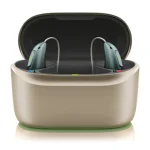Most people don’t think much about their hearing until something feels off. Maybe conversations seem muffled, or certain sounds are harder to catch. A hearing evaluation is the first step toward understanding what’s happening and finding solutions that keep daily life enjoyable.
Knowing what to expect can make the process much easier. Hearing health professionals use these evaluations to get a clear picture of how well the ears work and what can be done to improve hearing.
What Happens During a Hearing Test?
A hearing test is painless and usually takes less than an hour. It involves listening to different sounds through headphones and responding when a tone is heard. Another part of the test may include words spoken at different volumes to measure how well speech is understood.
The results show how well each ear hears different pitches and volumes. If there is any hearing loss, the evaluation helps determine whether it is mild, moderate, or severe. These details help hearing health professionals recommend the right steps for better hearing health.
When Should a Hearing Test Be Scheduled?
Hearing evaluations should not be put off until hearing loss becomes noticeable. Experts suggest getting a baseline test as an adult and scheduling regular checkups, especially after age 50. A test is also important if there is frequent ringing in the ears, trouble following conversations, or difficulty hearing in noisy settings.
Certain jobs and hobbies expose people to loud sounds that can damage hearing over time. For example, musicians, construction workers, and hunters should consider routine hearing tests. Early detection makes a big difference in managing hearing health.
Do Hearing Tests Hurt?
Hearing evaluations are completely painless. The process involves listening to different sounds at various volumes, but no discomfort is involved. Some people may feel slightly anxious about the results, but the test is simple and stress-free.
Can Hearing Loss Be Treated?
With the right approach, many types of hearing loss can be managed. Hearing aids, assistive devices, and medical treatments can improve hearing and quality of life. The evaluation helps determine the best options based on individual needs.
Some hearing loss may be temporary, caused by earwax buildup or infections. In these cases, treatment can restore normal hearing. If the loss is permanent, modern hearing aids and technology provide effective solutions for clear and comfortable hearing.
Are Online Hearing Tests Reliable?
Online hearing tests can provide a general idea of hearing ability but are not a replacement for a professional evaluation. These tests often rely on basic sound recognition and do not check for issues inside the ear. A full hearing test performed by a hearing health professional provides a much more accurate diagnosis.
A professional evaluation includes multiple types of tests to check different aspects of hearing. The environment is also controlled to ensure accurate results. Anyone who suspects hearing loss should schedule an in-person hearing test for the best assessment and recommendations.






